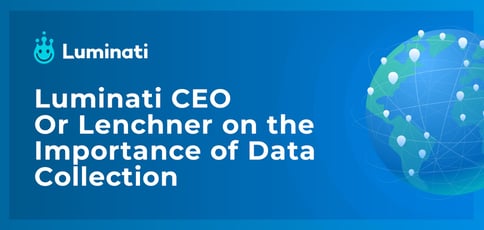
TL; DR: The unpredictability of global markets in the COVID-19 era is forcing businesses to rethink their strategies — and the especially savvy ones are turning to data for insight on how to do so successfully. As CEO of Luminati, a company known for helping its users extract publicly available web data at scale, Or Lenchner knows it’s never too early to get started on a data strategy. He suggests leaders embrace data collection as a commodity and leverage the power of automation so teams can focus on their core competencies. Fortunately, new self-serve options on the market make the process easier than ever.
COVID-19 has changed the world, and it’s becoming glaringly evident that there is no returning to business as usual.
Take the ecommerce industry, for instance. The internet’s share of total retail sales skyrocketed from 16% to 27% in the first eight weeks of quarantine. Pre-pandemic, it took 10 years to achieve that amount of growth.
Many businesses are scrambling to formulate online strategies that will keep them afloat in this new and unpredictable reality. According to Or Lenchner, CEO of Luminati, data collection can point business leaders in the right direction — but few know how to get started.

Or Lenchner, CEO of Luminati, gave us the scoop on how to get started with data collection (it’s not as scary as it seems!).
“We’ve been receiving many questions focusing on the ways data can be used to predict the future,” said Or, whose company helps users extract publicly-available web data at scale. “They are fully aware that data can assist them in navigating this crazy market and their future business moves but do not know how to go about it or how to best leverage data as a whole.”
As people embrace a new way of shopping, data is becoming as critical to online operations as network and server infrastructure. In the same way that companies leverage cloud-based solutions to outsource their hosting needs, they’re depending on online data collection and analysis to make decisions that will positively impact their revenue.
“The big market players have been shifting their data collection processes to automated ones,” Or told us. “Meanwhile, the smaller and medium players have been looking for cost-effective ways to collect data and seem puzzled regarding the necessary first steps to take.”
Feeling the same way? Read on: Or gave us the scoop on how to get started with data collection, the power of automation, and how advanced technology means you don’t have to be a data scientist to find success online.
Getting Started with Data-Driven Decision-Making
Or said that it’s never too early to map out a data collection strategy — and not just for those in ecommerce. Other online verticals, such as brand protection, ad verification, and domestic travel, are seeing increased adoption of big data due to the pandemic.
“As ecommerce grows, so do the brand protection agencies that serve companies that sell online,” he said. “For example, they search online to find fake products or monitor online resellers to ensure that they adhere to brand standards. We are seeing many customers in that industry looking for help with data collection.”
Businesses that verify the legitimacy of advertisements are also increasingly relevant as internet traffic booms. Or told us that even customers in the travel industry, where business has taken a significant hit, are turning to data to navigate a new normal.
“Many of our customers that were focused on flights have begun to collect data related to car rentals because more domestic travel equals more car rentals,” he said. “They’re gaining a competitive advance by shifting their business where the data says they should.”
Or said that getting started isn’t as difficult as it may seem.
“For some businesses, it sounds a bit intimidating, as if it will require heavy lifting to access the data you need,” he said. “But the first step is simply defining the problem you need to solve.”
Common needs include identifying a target audience, setting prices, or gathering competitive intelligence. Whatever the problem is, the next step is to determine the type of publicly available data needed to support the solution and begin collecting it.
“No matter what size your business is, you need to try to collect the data manually, on a small scale,” Or said. “Most companies instantly turn to engineers for crawlers, scrapers, and unblocking mechanisms, but investing a couple of hours in doing it yourself will help you sharpen your requirements and understand the process that you need to undertake at scale. This will help you better explain your needs to an external vendor.”
The Value of Embracing Data Collection as a Commodity
Or told us that today’s businesses must turn to live data to inform their decisions, as the analyst reports of the past can’t keep up with a fast-paced web. Doing so efficiently and at scale is a complex task that’s best left to the professionals.
“Data has become mission-critical business infrastructure as everyone tries to cut expenses and boost revenue,” he said. “Not having access to quality data is almost equal to server outages in the hosting world.”
At the same time, as with hosting or even online payment solutions, online data collection and analysis isn’t your typical business owner’s forte.
“Think of it this way: 10 to 15 years ago, if you were setting up an ecommerce website, you’d have to have a direct integration with Visa and Mastercard to facilitate transactions, you had to be PCI compliant, and you needed to make sure that the communication is 128 bit encrypted — all of the things that today you get instantly with Stripe,” Or said.

Luminati’s Data Collector features an assistant that automatically retrieves web data.
Instead of hiring a dedicated data engineering staff, today’s online businesses can turn to organizations such as Luminati to outsource their data collection needs.
“Take these four engineers that will usually run the crawlers, scrapers, other mechanisms that you need to collect data, and focus them on your proprietary technologies instead, whether you’re in ecommerce, travel, whatever industry it may be.”
There’s just one caveat, according to Or: Make sure to maintain some level of in-house data capabilities, however small.
“I always suggest to our customers — even when data is a commodity — that they should have someone who understands the data on staff to validate what you’re getting from an external vendor,” he said. “That vendor should give you the data that’s qualified, checked, parsed, validated. Otherwise, you could make decisions based on incorrect data.”
Take the Plunge with Self-Service Data Collection
According to Or, the online travel sector, worth a whopping $800 billion, is still struggling to recover from COVID-related setbacks. To cope, businesses in the industry are turning to online data collection and analysis now more than ever.
“When fewer customers are paying you money, you have to try to win every single deal — and the only way to win every single deal is to convert every user,” he said. “This is especially true in the travel sector, where losing a deal to a competitor is something you can’t afford.”
Or told us that these companies are also forced to layoff employees, including engineers.
“Some of them find our Luminati’s Data Collector (formerly known as DCA, or Data Collection Automation) to be an ideal fit,” he said. “It can substitute for the manpower they had to reduce or allow them to focus on their business while maintaining the advantage of fresh, accurate data.”
The platform makes it a breeze to extract and structure data, ensuring it’s ready for use in driving innovation, efficiency, and revenue. Luminati is currently enhancing the platform’s self-service features to make the user experience more intuitive than ever.
“We’re working hard to ensure that our Data Collector is as advanced as possible while being 100% self-service.”
HostingAdvice.com is a free online resource that offers valuable content and comparison services to users. To keep this resource 100% free, we receive compensation from many of the offers listed on the site. Along with key review factors, this compensation may impact how and where products appear across the site (including, for example, the order in which they appear). HostingAdvice.com does not include the entire universe of available offers. Editorial opinions expressed on the site are strictly our own and are not provided, endorsed, or approved by advertisers.
Our site is committed to publishing independent, accurate content guided by strict editorial guidelines. Before articles and reviews are published on our site, they undergo a thorough review process performed by a team of independent editors and subject-matter experts to ensure the content’s accuracy, timeliness, and impartiality. Our editorial team is separate and independent of our site’s advertisers, and the opinions they express on our site are their own. To read more about our team members and their editorial backgrounds, please visit our site’s About page.

